
Joseph Freinademetz, was a Ladin Catholic priest and missionary in China. He was a member of the Society of the Divine Word.
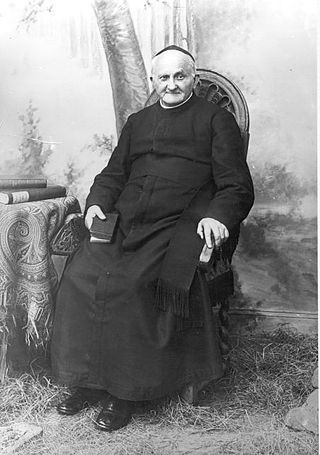
Arnold Janssen, was a German-Dutch Catholic priest and missionary who is venerated as a saint. He founded the Society of the Divine Word, a Catholic missionary religious congregation, also known as the Divine Word Missionaries, as well as two congregations for women. In 1889 he founded in Steyl, Netherlands, the Missionary Sisters Servants of the Holy Spirit and in 1896 at the same place the Holy Spirit Adoration Sisters. He was canonized on 5 October 2003, by Pope John Paul II.

Religion in Papua New Guinea is dominated by various branches of Christianity, with traditional animism and ancestor worship often occurring less openly as another layer underneath or more openly side by side with Christianity. The Catholic Church has a plurality of the population. The courts, government, and general society uphold a constitutional right to freedom of speech, thought, and beliefs. A secular state, there is no state religion in the country, although the government openly partners with several Christian groups to provide services, and churches participate in local government bodies.

The Society of the Divine Word, abbreviated SVD and popularly called the Verbites or the Divine Word Missionaries, and sometimes the Steyler Missionaries, is a Catholic clerical religious congregation of Pontifical Right for men. As of 2020, it consisted of 5,965 members composed of priests and religious brothers working in more than 70 countries, now part of VIVAT international. It is one of the largest missionary congregations in the Catholic Church. Its members add the nominal letters SVD after their names to indicate membership in the Congregation. The superior general is Anselmo Ricardo Ribeiro, who hails from Brazil.
The Catholic Church in Papua New Guinea is part of the worldwide Catholic Church, under the spiritual leadership of the Pope in Rome. Papua New Guinea has approximately two million Catholic adherents, approximately 27% of the country's total population.
The College of the Holy Spirit of Tarlac is a private, Catholic basic and higher education institution run by the Missionary Sisters Servants of the Holy Spirit in Tarlac, Philippines. It was established in 1939 as the Catholic Academy of Tarlac.

The Holy Spirit Adoration Sisters are a Catholic religious institute. The nuns live a contemplative life, focused on perpetual adoration of the Blessed Sacrament, offering intercessory prayers for the world 24 hours a day. Inside the enclosure the nuns wear rose-colored tunics with their habits symbolizing their joy for the Holy Spirit. As a consequence of these habits, the nuns are known colloquially as the "pink sisters".

William (Wilhelm) Finnemann was a priest of the Society of the Divine Word, auxiliary bishop of Manila and apostolic vicar of Calapan, the Philippines. He was martyred by the Japanese through being thrown into the sea near Verde Island off the coast of Batangas City, Batangas.
This is a list of selected references for Christianity in China.
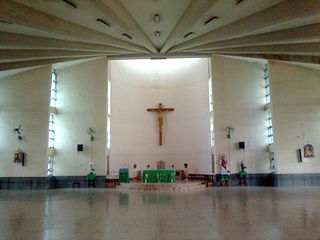
The Roman Catholic Diocese of Rourkela is a diocese located in the city of Rourkela in the ecclesiastical province of Cuttack-Bhubaneswar in India.
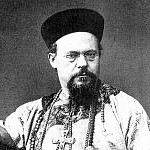
Johann Baptist Anzer, S.V.D., was a member of the Society of the Divine Word, popularly known as the Divine Word Missionaries, and Catholic bishop of the German Mission to China in Shandong Province.

Andreas Amrhein was a Swiss Benedictine monk who founded the Benedictine Congregation of Saint Ottilien and the Missionary Benedictine Sisters of Tutzing to combine the Benedictine way of life with activity in the mission field.
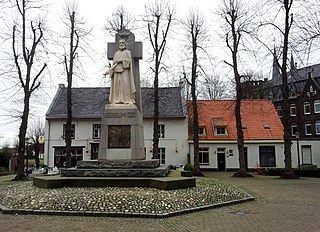
Steyl is a village in the Tegelen district of the municipality of Venlo, the Netherlands. The village on the river Meuse is mainly known for its monasteries. In 2004, a section of the village including four monasteries was made a conservation area under protection of the Dutch heritage agency Rijksdienst voor het Cultureel Erfgoed.
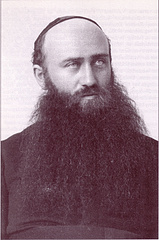
Georg Maria Stenz was a Catholic missionary of the Society of the Divine Word in Shandong during the period from 1893 to 1927. He was involved in two major incidents where force was used against Catholic missionaries in Shandong, the Juye incident and the Jietou incident. The Juye incident (1897) was an attack on Stenz's mission station in Zhang Jia Village in which two German missionaries were killed. Stenz, the target of the attack, managed to hide and escaped unharmed. The incident was used by the German Empire to justify the occupation of Qingdao. In the Jietou incident, Stenz and a group of Chinese Christians were mistreated and held prisoner in the village of Jietou for three days resulting in German military intervention and compensation claims.

Hendrina Stenmanns, SSpS was a German Catholic religious sister who co-founded the Missionary Sisters Servants of the Holy Spirit, which she founded alongside Arnold Janssen and Helena Stollenwerk. She was also a professed member of the Third Order of Saint Francis since 1871. Stenmanns was beatified on 29 June 2008 in the Netherlands. Pope Benedict XVI delegated Cardinal José Saraiva Martins to preside over the celebration on his behalf.

Helena Stollenwerk, SSpS was a German Catholic religious sister who collaborated with Arnold Janssen and Hendrina Stenmanns and co-founded the Missionary Sisters Servants of the Holy Spirit.

The Comboni Missionaries of the Heart of Jesus, also known as the Comboni Missionaries of the Sacred Heart, or the Verona Fathers, and originally called the Sons of the Sacred Heart of Jesus, is a Catholic clerical male religious congregation of pontifical right.

The Missionary Clarisses of the Most Holy Sacrament is a female religious institute of pontifical right. The sisters of this congregation use the initials M.C.

















